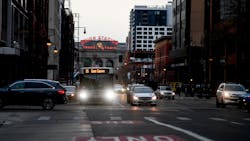Denver RTD survey reveals public cautious about using public transit
According to a survey administered to nearly 2,700 people earlier this month by the Denver Regional Transportation District (RTD), the public remains apprehensive about engaging in social activities amid the spread of the coronavirus, including riding RTD services. The majority of those who had not used transit in the past 30 days said they will take a wait-and-see approach to the pandemic before riding again.
These are some of the key findings from the survey, conducted online for a weeklong period beginning May 4. RTD collected feedback from customers to assess their attitudes surrounding the virus, including their thoughts about using transit services. A total of 2,662 people participated in the survey, which was made available on the RTD website in English and Spanish and through various social media channels. The agency will use the findings to inform its recovery efforts moving forward.
“The results align with those emerging in surveys of other industries. During this uncertain time, people naturally want to feel as safe as possible, and they want to know that RTD is doing all we can on their behalf,” said interim RTD General Manager and CEO Paul Ballard. “We respect that certain factors the public noted are beyond our control, and that they will feel comfortable returning to transit at different times, depending upon factors that are unique to their lives.”
Respondents were asked to rate six activities according to their perceived level of safeness. Riding RTD was deemed the least safe of the activities people might participate in during the pandemic, relative to the other choices provided in the survey. These were grocery shopping, visiting a drugstore or pharmacy, visiting friends, visiting family and exercising outside.
The survey also sought feedback from respondents about what will need to happen for them to feel safer riding RTD services. More than 2,400 open-ended responses to this question were submitted, all of Regional Transportation District 1660 Blake Street Denver, CO 80202 720.326.7311 Media Line which were reviewed and categorized by RTD’s market research team.
The most prominent themes expressed in response to this question include:
- Requiring personal protective equipment (PPE) such as face coverings for operators and passengers.
- Assurance that RTD vehicles are cleaned and sanitized frequently and thoroughly observance of social distancing on vehicles.
- A significant decline in the number of new COVID-19 cases.
- The creation of a vaccine.
- A limit on the number of passengers on vehicles.
- Increasing or restoring service levels to minimize the risk of crowding.
- Widespread availability of testing.
- Providing sanitizer for passengers.
- Addressing homelessness on vehicles.
Denver RTD says it has enacted many of the measures the public identified. All the agency’s bus and rail operators are required to wear face coverings, and Denver RTD says it has called on its riders to take responsibility for the safety of themselves and others by doing the same. The agency is cleaning and sanitizing all vehicles each day using an EPA-approved emerging-virus disinfectant. To maintain proper social distancing between operators and riders, Denver RTD last month suspended fare collection and switched to rear-door boarding and exiting on most buses. The agency’s staff has been monitoring passenger loads across the system and working to minimize the number of passengers on vehicles. Denver RTD says its staff are in regular communications with health officials and are closely following the latest health care guidance to ensure an appropriate response to the coronavirus.



